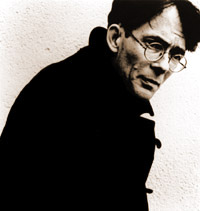|
|
||||||||||||
|
|||
|
|
Dennis Danvers is the author of six fantasy
and science fiction novels: The Watch (a New York Times
Notable Book for 2002 and one of Booklist's ten best science
fiction novels of the year); Wilderness (1991, a nominee
for the Locus First Novel award and the Horror Writers Association's
Bram Stoker first novel award), Circuit of Heaven (a New
York Times Notable Book for 1998), End of Days (1999),
The Fourth World (2000), and Time and Time Again (2001).
He holds an MFA in fiction writing from Virginia Commonwealth University
and a PhD from the University of Texas at Arlington and has taught
writing and literature at both undergraduate and graduate levels.
He lives in Richmond and Williamsburg, Virginia.
|
 WILLIAM
GIBSON
WILLIAM
GIBSON
|
William Gibson's current novel, Pattern Recognition,
appeared this year from G. P. Putnam's Sons, and is reviewed here
by Dennis Danvers. His first novel, Neuromancer (Ace, 1984),
won the Hugo Award, the Philip K. Dick Memorial Award, and the Nebula
Award, all given for excellence in science fiction writing. Gibson
coined the term "cyberspace," and envisioned both the
Internet and virtual reality before either existed. He is the author
of six other novels, All Tomorrow's Parties (Putnam,1999);
Count Zero (Ace, 1987); Mona Lisa Overdrive (1988)
and Virtual Light (1993), both from Bantam; Idoru
(Putnam, 1996); and, with Bruce Sterling, The Difference Engine
(Spectra, 1992). Burning Chrome, a collection of short stories,
was published by Ace in 1987. Gibson lives in Vancouver, British
Columbia.
|